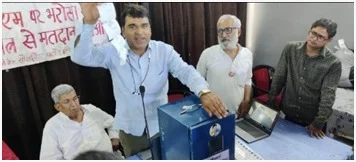In a bold stance against the use of electronic voting machines (EVMs) and Voter Verifiable Paper Audit Trail (VVPAT) systems, a group of voters in Uttar Pradesh have issued a warning to walk out of polling booths if traditional ballot papers are not provided during the upcoming elections, reports The Telegraph. Sandeep Pandey, a prominent social worker leading the initiative, expressed distrust in the electronic voting technologies, citing concerns over potential manipulation.
At a press conference held in Lucknow on April 6, Pandey emphasized their plan to reject EVMs and VVPATs and instead demand paper ballots. He stated, “We have already informed the Election Commission of India about our plan while making it clear that we don’t trust the electronic voting machines and the black-glass VVPATs. If not provided with ballot papers, we will simply walk out of the booths without voting.”
Pandey, known for returning his Magsaysay Award in protest against American policies towards Palestine, is an alumnus of IIT Kanpur and holds dual MS degrees from Syracuse University, New York, and a PhD from the University of California, Berkeley. He actively supports education initiatives for underprivileged children and leads the Socialist Party (India).
Accompanying Pandey at the conference was Pawan Kumar, a Lok Sabha election nominee from Bhilwara, Rajasthan, representing the Right to Recall Party. Kumar demonstrated alleged vulnerabilities in EVMs and VVPATs, asserting that votes could be manipulated based on preset programming within the machines.
Kumar explained, “Whenever two voters push the same button, one vote goes to a party for which the machine has been programmed.” He further questioned recent changes in VVPAT design and functionality, highlighting concerns over transparency and integrity in the voting process.
The Election Commission (EC) has maintained that it takes stringent measures to prevent tampering with EVMs and VVPAT machines. However, the persistence of doubts among certain voters reflects broader skepticism towards electronic voting technologies in India’s electoral landscape.
As the elections draw nearer, the stance taken by these Uttar Pradesh voters underscores ongoing debates surrounding the efficacy and security of electronic voting systems in the world’s largest democracy.
As a common voter, these concerns raised by Sandeep Pandey and Pawan Kumar are thought-provoking. The reliance on technology like EVMs and VVPATs has undoubtedly transformed our electoral process, but lingering doubts about their susceptibility to manipulation raise valid questions. The demand for traditional ballot papers reflects a desire for transparency and trust in the voting system.
While the Election Commission assures us of safeguards against tampering, the need for ongoing dialogue and scrutiny regarding electoral technology is evident. As voters, we seek assurance that our democratic right to vote is protected and that every vote counts accurately. Ultimately, the goal should be a voting process that not only incorporates technological advancements but also upholds the integrity and credibility of our democratic elections.


